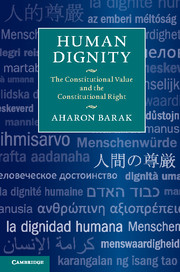Book contents
- Frontmatter
- Contents
- Preface
- Acknowledgements
- Table of Cases
- Part I Fundamental concepts and sources
- Part II Human dignity as a constitutional value
- Part III Human dignity as a constitutional right
- Part IV Human dignity in comparative law
- 11 Human dignity in American constitutional law
- 12 Human dignity in Canadian constitutional law
- 13 Human dignity in German constitutional law
- 14 Human dignity in South African constitutional law
- 15 Human dignity in Israeli constitutional law
- Bibliography
- Index
- References
12 - Human dignity in Canadian constitutional law
Published online by Cambridge University Press: 05 February 2015
- Frontmatter
- Contents
- Preface
- Acknowledgements
- Table of Cases
- Part I Fundamental concepts and sources
- Part II Human dignity as a constitutional value
- Part III Human dignity as a constitutional right
- Part IV Human dignity in comparative law
- 11 Human dignity in American constitutional law
- 12 Human dignity in Canadian constitutional law
- 13 Human dignity in German constitutional law
- 14 Human dignity in South African constitutional law
- 15 Human dignity in Israeli constitutional law
- Bibliography
- Index
- References
Summary
The lack of an independent right to human dignity
The term “human dignity” is not expressly mentioned in the Canadian Charter of Rights and Freedoms or in any other part of the constitution. The preamble to the Charter states:
Whereas Canada is founded upon principles that recognize the supremacy of God and the rule of law.
The preamble does not expand on this, nor does it determine anything regarding human dignity. Thus human dignity does not constitute an independent, freestanding right.
Rejection of human dignity as a derived (daughter) constitutional right
Does the Canadian Charter recognize human dignity as a constitutional right derived from one of the independent rights it has enshrined within? Is human dignity recognized as a daughter-right of the mother (framework)-right set out in section 7 of the Canadian Charter? That right determines:
Everyone has the right to life, liberty and security of the person and the right not to be deprived thereof except in accordance with the principles of fundamental justice.
Should a daughter-right to human dignity not be derived from the right to life, liberty or security of the person? As we shall see, human dignity is a central constitutional value in the Canadian Charter. Should it not be said that fulfillment of that value in the framework of the constitutional right to life, liberty or security of the person establishes a daughter-right to human dignity?
- Type
- Chapter
- Information
- Human DignityThe Constitutional Value and the Constitutional Right, pp. 209 - 224Publisher: Cambridge University PressPrint publication year: 2015



